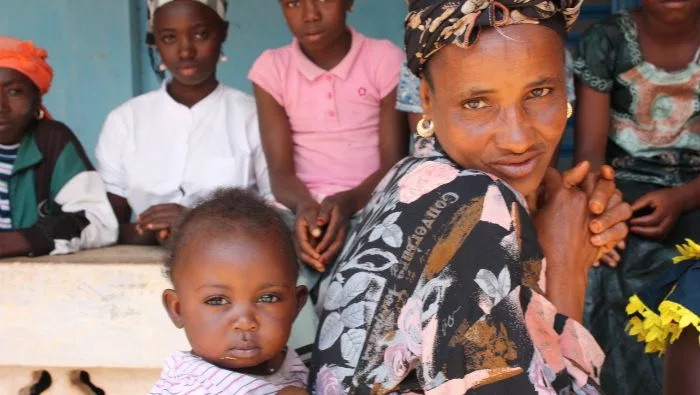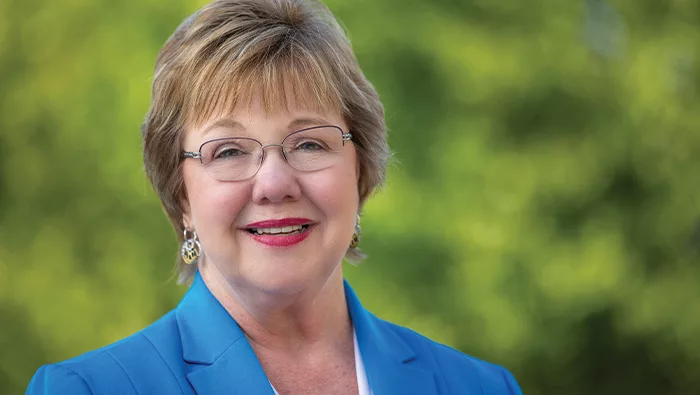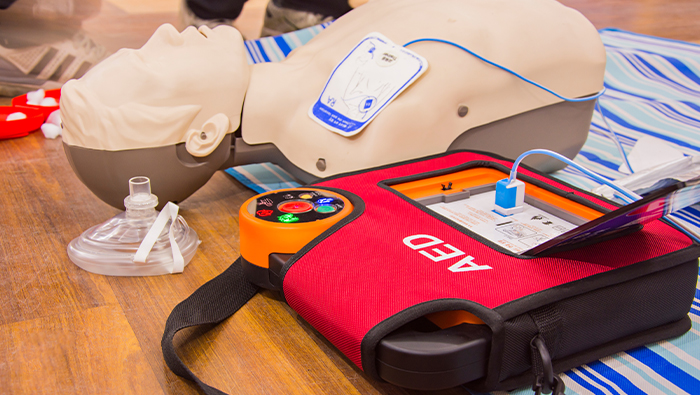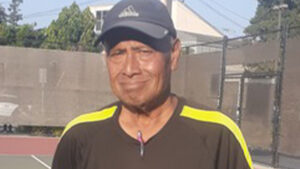Experience has shown Kiwanis International President Katrina Baranko that everyone has potential — and an opportunity to fulfill it.
For many Kiwanis members, the path to leadership doesn’t start with a grand personal ambition. In fact, a leadership journey often begins with someone else’s encouragement. Even the first step comes only after a little nudge from fellow Kiwanians.
That’s how it began for Katrina Baranko. Now the 2023-24 Kiwanis International president, Baranko was about a year into her membership with the Kiwanis Club of Albany, Georgia, U.S., in 1994 when she was asked to be a committee chair.
She didn’t reject the request, but she wasn’t sure what the role required — and she said so. Fortunately, her fellow club members understood that leadership roles often come with a learning curve.
“They assured me they’d support me, show me what to do, give me my little task list,” she says now. “And they did.”
That support was decisive for Baranko. It was also an early insight into what makes leadership roles seem possible for Kiwanians.
“I hope we encourage and emphasize mentorship this year,” she says. “It’s so important that we tap people on the shoulder and ask them to step up, but also assure them that if they do, we’ll be there to support them and help them do a good job. That’s what my Kiwanis mentors did along the way.”
Commitment and community
That sense of being needed was a big reason why Baranko felt persuaded to join Kiwanis. She had worked as an educator for 15 years before leaving the profession to start her own business in women’s apparel. But her previous work with young people made her a natural prospect for the Albany Kiwanis club.
“A friend of mine asked me to join — at least six times — before I said, ‘Fine, I’ll go to lunch,’” Baranko says, smiling at the memory. “She wasn’t going to give up.”
“I was brought up that you give back to the community that supports you. So, I thought, ‘Wow, this is a win-win. They’re doing that kind of work and I can get on that vehicle and be part of it.’”
As it turned out, the club had recently raised money to purchase a van for a local shelter for kids who were victims of abuse — and they were presenting the key to the organization’s director at the club meeting Baranko visited. It was an eye-opening moment regarding the club’s impact, she says, but it also resonated with her belief in community.
“I was brought up that you give back to the community that supports you. So, I thought, ‘Wow, this is a win-win. They’re doing that kind of work and I can get on that vehicle and be part of it.’”
What distinguishes Kiwanis
Baranko’s career in education also gave her experience in a core Kiwanis cause: youth leadership development.
She taught business education in high school as a teacher, and she was an advisor to the Future Business Leaders of America. During that time, she found that the brightest talents don’t always belong to the most obvious people.
“So many of them are not the star students,” Baranko says. “It was important to me to help those kids find their way because they can kind of fall by the wayside. When we went to district and national competitions, some of them would come in first place in something for the first time.”
That kind of experience continued with Kiwanis. One of her fondest memories came during her time as the Georgia District governor, a position that requires service on Key Club’s district board.
“There was a young man who was a new member of the board,” she says. “He wouldn’t talk, he was very shy — and three years later he was elected Key Club governor of our district. Just to watch their growth, from when they’re not sure of themselves to when they’re using the things they’ve learned, it’s special to watch them kind of find themselves.”
For Baranko, the Kiwanis family is unmatched in creating stories like that. “When people ask who Kiwanis is, what distinguishes us, that’s what I say: Nobody does service leadership for youth like we do.”
Wide-open opportunity
One point of emphasis for Baranko in 2023-24 will be Builders Club. As a high school teacher, she learned how important students’ middle years are to their future success.
“If you haven’t reached a kid by high school, it can be hard to get through that shell,” she says. “Those middle years can be a volatile time in a kid’s development, and it’s an important time for us to work with them.”
Baranko credits 2022-23 Kiwanis International President Bert West’s emphasis on K-Kids as an excellent building block — and a way to help members see the broader scope of personal development.
“Ultimately we want to promote the whole Kiwanis family,” she says. “It’s about the journey from K-Kids to Kiwanis.”
“If you haven’t reached a kid by high school, it can be hard to get through that shell. Those middle years can be a volatile time in a kid’s development, and it’s an important time for us to work with them.”
The journey doesn’t stop with adulthood. For Baranko, that’s a key reason for continuing to support personal growth within Kiwanis clubs as well — whether a member is actively interested in leadership or needs reinforcement.
“I think the leadership opportunity is wide open for anyone who wants to pursue it,” she says. “But not all of us say, ‘I’ll do it, I’ll do it.’ We need to keep an eye out for people with leadership qualities. We need people to be tapped on the shoulder.”
Baranko remembers. When she was first asked about committee leadership, she thought of herself as “more of a presenter, not a speaker.” It was helpful to have fellow members who believed she could meet requirements rather than telling her they didn’t exist.
“It was important to be pushed a little bit out of my comfort zone,” she says. “It turned out to be a good thing.”
Expectations and support
When someone asks Baranko about a leadership role, she tries to be specific about a position’s duties.
“We need to be honest about the expectations of leadership,” she says. “But we also need to be clear that they have support — including Kiwanis resources, district resources and Club Leadership Education. They have help.”
Even people who become Kiwanis International trustees need encouragement. Baranko was elected to the Kiwanis International board in 2018, and she initially had no intention of running for vice president. As she got more than halfway into her three-year term as a trustee, she remained wary.
“I struggled with it a bit — I didn’t know if I wanted to do it,” she says. “But (as a trustee) I met so many people in the districts and realized I wanted to be part of watching them grow. Sometimes when I go to a district, I think, ‘Oh, yeah — this is why I’m a Kiwanian. This is why we do this.’
“As I got closer to my third year, I got a lot of encouragement from people, and I decided I was going to give it a shot.”
All one issue
Now she’s stepping into the role of Kiwanis International president. Like her immediate predecessors, she considers membership growth the primary task for the organization. She says it’s the issue from which everything else flows.
“Leadership, education and our Service Leadership Programs are important,” she says, “but without members we don’t have a pool of leaders to choose from. And without members, who do we educate? Without members, who’s going to support our SLPs?
“To me, it’s all one issue. We’ve got to get new members in.”
There are always challenges, Baranko adds, but she believes it’s a time for Kiwanis clubs to stay positive and remember why they exist.
“They just need to continue focusing on the work they do — supporting our youth programs and making our communities better,” she says. “Like I tell them, you’re the light in your community. You’re the ray of hope.”




